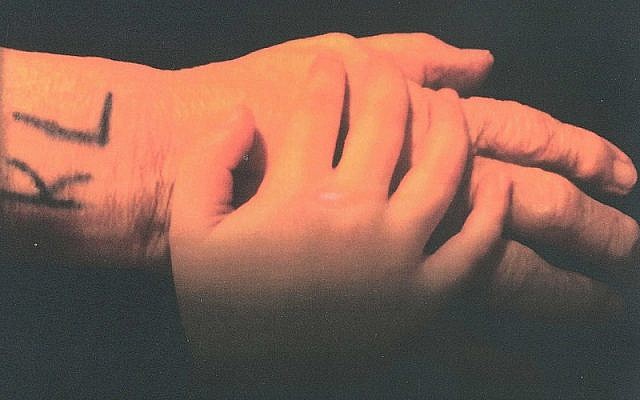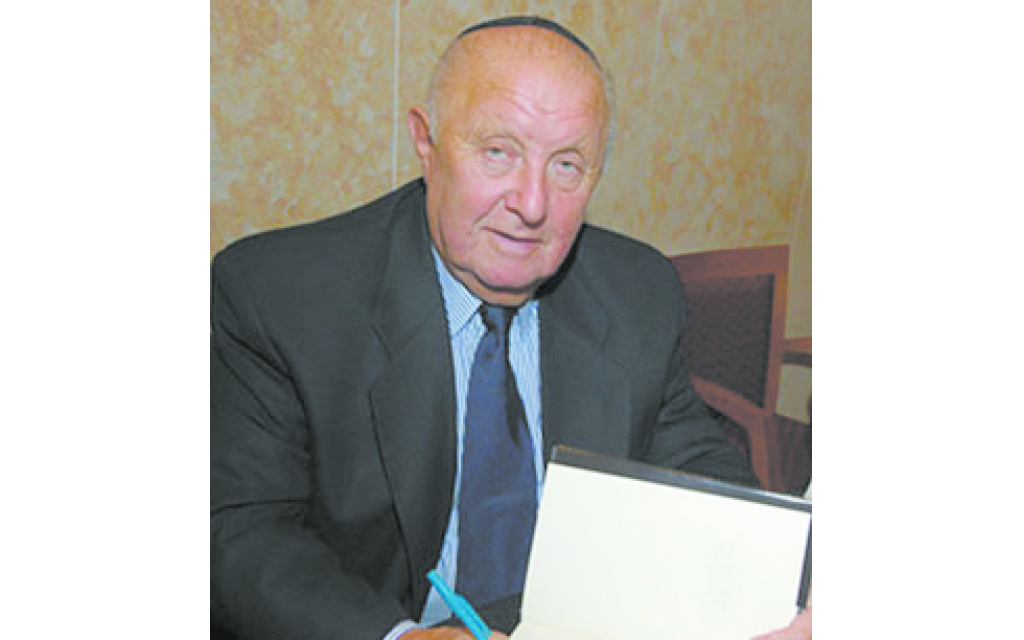Norbert Friedman, z”l, an Appreciation
Norbert, who died Feb. 6 at age 96, was a storyteller, a raconteur, an educator, an author, and a witness to inhumanity.
Dave Schechter is a veteran journalist whose career includes writing and producing reports from Israel and elsewhere in the Middle East.

It was my privilege to know Norbert Friedman.
There was something uplifting about spending time with this man who survived 11 Nazi concentration camps, who surely had earned the right to view life in dark terms – yet radiated light.
Norbert, who died Feb. 6 at age 96, was a storyteller, a raconteur, an educator, an author, and a witness to inhumanity.
He felt a responsibility to posterity, to remember not only the Jews who perished in the Holocaust, but also those who resisted, those who came to the aid of others, and those who survived to rebuild shattered lives.
Norbert fulfilled this obligation through decades of speeches and interviews, and books and articles.
In early 2015, my wife, Audrey Galex, told me about then 92-year-old Friedman, who was coming into AIB-TV (Atlanta Interfaith Broadcasters) once a week to record chapters of his memoir, “Sun Rays at Midnight: One Man’s Quest for the Meaning of Life, Before, During, and After the Holocaust.”
At the time, I was writing an article for the Atlanta Jewish Times about a future without Holocaust survivors.
“The narrators are disappearing. The narrative changes. The lessons of the Holocaust are eternal,” Norbert told me.
I sat in the recording booth as Norbert read aloud, in his Polish-accented English. His stories were grim, they were harrowing, they were funny, they were touching.
“His memoir is written with the honesty and attention to detail of the journalist he had hoped to be rather than the machinist he became,” I wrote in that article.

When we were introduced, Norbert asked if I knew the origin of my name. It comes from Yiddish, the shochet, the ritual slaughterer. That is how I learned that his father had been a shochet.
I asked: How can you not be bitter and angry after your mother, brother, grandparents, and 50 other relatives died in the gas chambers at Belzec; after “KL” (for Konzentrationslager, concentration camp) was tattooed on your right forearm at Mielec, after you were an 80-pound man hiding in a barn when the United States Army liberated Ganacker?
There was a time when Norbert was angry; not so much at the Germans, they were a known quantity, but at a world he felt had abandoned the Jews.
In Dachau, Norbert could hear allied bombers flying overhead, bypassing the camp and its rail lines.
“And we begged them, ‘Please bomb. Bomb us … together with our tormentors!’ Cause we didn’t ever think we were gonna survive by that time. This was five years of war already in 1944. … The only chance we had is to choose how we’re gonna die,” he said in an interview archived by Kennesaw State University’s Museum of History and Holocaust Education.
In the late 1960s, Norbert and his wife Marilyn were raising their sons in West Hempstead, N.Y. When in the company of other survivors, “We didn’t need to tell each other what we went through . . . through a word, a name, a place, and the other person understood.”
His rabbi “felt that my reluctance or failure to share my experience was an emotional burden. And he prodded me to share my experiences with the congregation,” Norbert said in that interview.
“And my exposure and my opportunity to speak to young people is what eventually cured me of what I didn’t know at that time was post-traumatic stress symptoms.”
When Norbert talked, people listened.
In August 2017, a road show called “Concert for America” came to the Ferst Center at Georgia Tech. Norbert was invited to speak at the beginning of the program.
From his wheelchair, he spoke for 10 minutes, telling his story and about how he found goodness in people.
No one made a sound. When he finished, he received a sustained, standing ovation.
Norbert was fond of Audrey, and every so often we met him (and one of his caregivers) for lunch.
The agenda was whatever he wanted to talk about: his past, his present, religion, politics, Audrey’s work, my work, his work, and once about National Hockey League stars from the late 1960s.
He gave me envelopes with articles he had written and wanted me to read.
At his 96th birthday party in December, Norbert asked if I would read chapters of a book he was writing (which would have been his third). Of course I would, but they never came.
As a cake with lighted candles was placed in front of him, Norbert requested that everyone recite the Shehechiyanu prayer to celebrate this joyous occasion.
He asked if anyone had a question. When no one did, he said, “Okay, let me tell you a story.” Everyone laughed, because once Norbert started, the floor was his for however long he chose.
“How do you do it?” someone asked. “Right now, I’m probably the happiest individual there is, and the most fortunate. And I do it by loving all the people, and that’s what keeps me happy, and optimistic,” Norbert answered.
“Many of you have forced me to change my thinking about life. For this I’m grateful. I will go wherever they take me, happy that I have known and I benefited from the love and friendships from such wonderful people as you,” he said.
It is we who benefited from the love and friendship we received from Norbert Friedman.
May his memory be a blessing.
Readers: You can watch Norbert read from his memoir and an AIB interview with Norbert at this link on YouTube.



comments